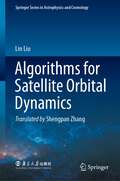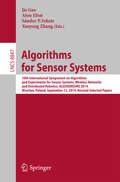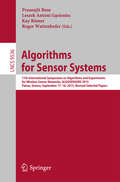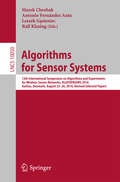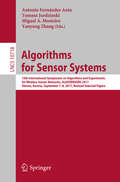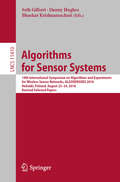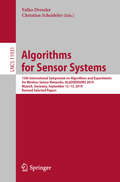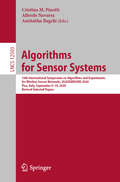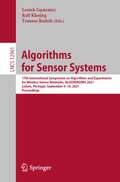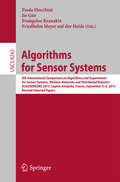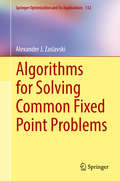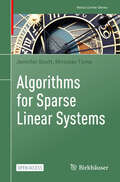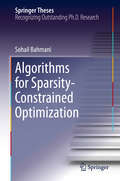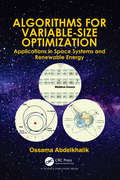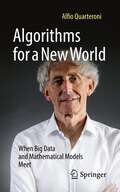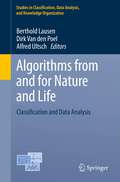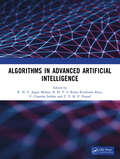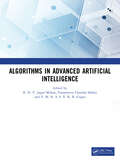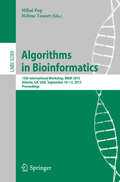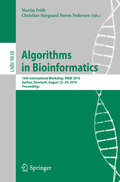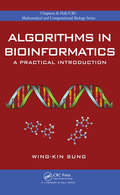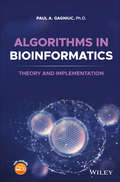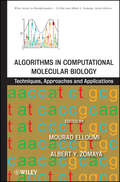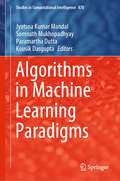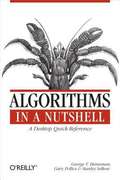- Table View
- List View
Algorithms for Satellite Orbital Dynamics (Springer Series in Astrophysics and Cosmology)
by Lin LiuThis book highlights the fundamental physics of orbit theory, dynamical models, methods of orbit determination, design, measurement, adjustment, and complete calculations for the position, tracking, and prediction of satellites and deep spacecraft. It emphasizes specific methods, related mathematical calculations, and worked examples and exercises. Therefore, technicians and engineers in the aerospace industry can directly apply them to their practical work. Dedicated to undergraduate students and graduate students, researchers, and professionals in astronomy, physics, space science, and related aerospace industries, the book is an integrated work based on the accumulated knowledge in satellite orbit dynamics and the author’s more than five decades of personal research and teaching experience in astronomy and aerospace dynamics.
Algorithms for Sensor Systems: 10th International Symposium on Algorithms and Experiments for Sensor Systems, Wireless Networks and Distributed Robotics, ALGOSENSORS 2014, Wroclaw, Poland, September 12, 2014, Revised Selected Papers (Lecture Notes in Computer Science #8847)
by Jie Gao Alon Efrat Sándor P. Fekete Yanyong ZhangThis book constitutes thoroughly refereed and revised selected papers from the 10th International Symposium on Algorithms and Experiments for Sensor Systems, Wireless Networks and Distributed Robotics, ALGOSENSORS 2014, held in Wroclaw, Poland, on September 12, 2014. The 10 papers presented in this volume were carefully reviewed and selected from 20 submissions. They are organized in topical sections named: robot planning; algorithms and data structures on graphs; and wireless networks.
Algorithms for Sensor Systems: 11th International Symposium on Algorithms and Experiments for Wireless Sensor Networks, ALGOSENSORS 2015, Patras, Greece, September 17-18, 2015, Revised Selected Papers (Lecture Notes in Computer Science #9536)
by Kay Römer Prosenjit Bose Leszek Antoni Gąsieniec Roger WattenhoferThis bookconstitutes revised selected papers from the 11th International Symposium onAlgorithms and Experiments for Wireless Sensor Networks, ALGOSENSORS 2015, heldin Patras, Greece, in September 2015. The 16 fullpapers presented in this volume were carefully reviewed and selected from 30submissions. The deal with algorithms analysis and problem complexity; computercommunication networks; computation by abstract devices; and mathematics ofcomputing.
Algorithms for Sensor Systems: 12th International Symposium on Algorithms and Experiments for Wireless Sensor Networks, ALGOSENSORS 2016, Aarhus, Denmark, August 25-26, 2016, Revised Selected Papers (Lecture Notes in Computer Science #10050)
by Marek Chrobak, Antonio Fernández Anta, Leszek Gąsieniec and Ralf KlasingThis book constitutes revised selected papers from the 12th International Symposium on Algorithms and Experiments for Wireless Sensor Networks, ALGOSENSORS 2016, held in Aarhus, Denmark, in August 2016. The 9 full papers presented in this volume were carefully reviewed and selected from 19 submissions. This year papers were solicited into three tracks: Distributed and Mobile, Experiments and Applications, and Wireless and Geometry.
Algorithms for Sensor Systems: 13th International Symposium on Algorithms and Experiments for Wireless Sensor Networks, ALGOSENSORS 2017, Vienna, Austria, September 7-8, 2017, Revised Selected Papers (Lecture Notes in Computer Science #10718)
by Yanyong Zhang Antonio Fernández Anta Tomasz Jurdzinski Miguel A. MosteiroThis book constitutes revised selected papers from the 13th International Symposium on Algorithms and Experiments for Wireless Sensor Networks, ALGOSENSORS 2017, held in Vienna, in September 2017. The 17 full papers presented in this volume were carefully reviewed and selected from 30 submissions. ALGOSENSORS is an international symposium dedicated to the algorithmic aspects of wireless networks. Originally focused on sensor networks, it now covers algorithmic issues arising in wireless networks of all types of computational entities, static or mobile, including sensor networks, sensor-actuator networks, autonomous robots. The focus is on the design and analysis of algorithms, models of computation, and experimental analysis.
Algorithms for Sensor Systems: 14th International Symposium on Algorithms and Experiments for Wireless Sensor Networks, ALGOSENSORS 2018, Helsinki, Finland, August 23–24, 2018, Revised Selected Papers (Lecture Notes in Computer Science #11410)
by Seth Gilbert Danny Hughes Bhaskar KrishnamachariThis book constitutes revised selected papers from the 14th International Symposium on Algorithms and Experiments for Wireless Sensor Networks, ALGOSENSORS 2018, held in Helsinki, Finland, in August 2018.The 15 full papers presented in this volume were carefully reviewed and selected from 39 submissions. ALGOSENSORS is an international symposium dedicated to the algorithmic aspects of wireless networks. Originally focused on sensor networks, it now covers algorithmic issues arising in wireless networks of all types of computational entities, static or mobile, including sensor networks, sensor-actuator networks, autonomous robots. The focus is on the design and analysis of algorithms, models of computation, and experimental analysis.
Algorithms for Sensor Systems: 15th International Symposium on Algorithms and Experiments for Wireless Sensor Networks, ALGOSENSORS 2019, Munich, Germany, September 12–13, 2019, Revised Selected Papers (Lecture Notes in Computer Science #11931)
by Falko Dressler Christian ScheidelerThis book constitutes revised selected papers from the 15th International Symposium on Algorithms and Experiments for Wireless Sensor Networks, ALGOSENSORS 2019, held in Munich, Germany, in September 2019. The 11 full papers presented in this volume were carefully reviewed and selected from 16 submissions. ALGOSENSORS is an international symposium dedicated to the algorithmic aspects of wireless networks.
Algorithms for Sensor Systems: 16th International Symposium on Algorithms and Experiments for Wireless Sensor Networks, ALGOSENSORS 2020, Pisa, Italy, September 9–10, 2020, Revised Selected Papers (Lecture Notes in Computer Science #12503)
by Cristina M. Pinotti Alfredo Navarra Amitabha BagchiThis book constitutes revised selected papers from the 16th International Symposium on Algorithms and Experiments for Wireless Sensor Networks, ALGOSENSORS 2020, held in Pisa, Italy*, in September 2020.The 12 full papers presented in this volume were carefully reviewed and selected from 27 submissions. ALGOSENSORS is an international symposium dedicated to the algorithmic aspects of wireless networks.*The conference was held virtually due to the COVID-19 pandemic.
Algorithms for Sensor Systems: 17th International Symposium on Algorithms and Experiments for Wireless Sensor Networks, ALGOSENSORS 2021, Lisbon, Portugal, September 9–10, 2021, Proceedings (Lecture Notes in Computer Science #12961)
by Leszek Gąsieniec Ralf Klasing Tomasz RadzikThis book constitutes revised selected papers from the 17th International Symposium on Algorithms and Experiments for Wireless Sensor Networks, ALGOSENSORS 2021, held in Lisbon, Portugal*, in September 2021. The 10 full papers presented in this volume were carefully reviewed and selected from 28 submissions. ALGOSENSORS is an international symposium dedicated to the algorithmic aspects of wireless networks. *The conference was held virtually due to the COVID-19 pandemic.
Algorithms for Sensor Systems: 9th International Symposium on Algorithms and Experiments for Sensor Systems, Wireless Networks and Distributed Robotics, ALGOSENSORS 2013, Sophia Antipolis, France, September 5-6, 2013, Revised Selected Papers (Lecture Notes in Computer Science #8243)
by Jie Gao Evangelos Kranakis Paola Flocchini Friedhelm Meyer auf der HeideThis book constitutes the proceedings of the 9th International Symposium on Algorithms for Sensor Systems, Wireless Ad Hoc Networks and Autonomous Mobile Entities, ALGOSENSORS 2013, held in Sophia Antipolis, France, in September 2013. The 19 papers presented in this volume were carefully reviewed and selected from 30 submissions. They deal with sensor network algorithms, wireless networks and distributed robotics algorithms; and experimental algorithms.
Algorithms for Solving Common Fixed Point Problems (Springer Optimization And Its Applications #132)
by Alexander J. ZaslavskiThis book details approximate solutions to common fixed point problems and convex feasibility problems in the presence of perturbations. Convex feasibility problems search for a common point of a finite collection of subsets in a Hilbert space; common fixed point problems pursue a common fixed point of a finite collection of self-mappings in a Hilbert space. A variety of algorithms are considered in this book for solving both types of problems, the study of which has fueled a rapidly growing area of research. This monograph is timely and highlights the numerous applications to engineering, computed tomography, and radiation therapy planning.<P><P> Totaling eight chapters, this book begins with an introduction to foundational material and moves on to examine iterative methods in metric spaces. The dynamic string-averaging methods for common fixed point problems in normed space are analyzed in Chapter 3. Dynamic string methods, for common fixed point problems in a metric space are introduced and discussed in Chapter 4. Chapter 5 is devoted to the convergence of an abstract version of the algorithm which has been called component-averaged row projections (CARP). Chapter 6 studies a proximal algorithm for finding a common zero of a family of maximal monotone operators. Chapter 7 extends the results of Chapter 6 for a dynamic string-averaging version of the proximal algorithm. In Chapters 8 subgradient projections algorithms for convex feasibility problems are examined for infinite dimensional Hilbert spaces.
Algorithms for Sparse Linear Systems (Nečas Center Series)
by Jennifer Scott Miroslav TůmaLarge sparse linear systems of equations are ubiquitous in science, engineering and beyond. This open access monograph focuses on factorization algorithms for solving such systems. It presents classical techniques for complete factorizations that are used in sparse direct methods and discusses the computation of approximate direct and inverse factorizations that are key to constructing general-purpose algebraic preconditioners for iterative solvers. A unified framework is used that emphasizes the underlying sparsity structures and highlights the importance of understanding sparse direct methods when developing algebraic preconditioners. Theoretical results are complemented by sparse matrix algorithm outlines.This monograph is aimed at students of applied mathematics and scientific computing, as well as computational scientists and software developers who are interested in understanding the theory and algorithms needed to tackle sparse systems. It is assumed that the reader has completed a basic course in linear algebra and numerical mathematics.
Algorithms for Sparsity-Constrained Optimization (Springer Theses #261)
by Sohail BahmaniThis thesis demonstrates techniques that provide faster and more accurate solutions to a variety of problems in machine learning and signal processing. The author proposes a "greedy" algorithm, deriving sparse solutions with guarantees of optimality. The use of this algorithm removes many of the inaccuracies that occurred with the use of previous models.
Algorithms for Variable-Size Optimization: Applications in Space Systems and Renewable Energy
by Ossama AbdelkhalikMany systems architecture optimization problems are characterized by a variable number of optimization variables. Many classical optimization algorithms are not suitable for such problems. The book presents recently developed optimization concepts that are designed to solve such problems. These new concepts are implemented using genetic algorithms and differential evolution. The examples and applications presented show the effectiveness of the use of these new algorithms in optimizing systems architectures. The book focuses on systems architecture optimization. It covers new algorithms and its applications, besides reviewing fundamental mathematical concepts and classical optimization methods. It also provides detailed modeling of sample engineering problems. The book is suitable for graduate engineering students and engineers. The second part of the book includes numerical examples on classical optimization algorithms, which are useful for undergraduate engineering students. While focusing on the algorithms and their implementation, the applications in this book cover the space trajectory optimization problem, the optimization of earth orbiting satellites orbits, and the optimization of the wave energy converter dynamic system: architecture and control. These applications are illustrated in the starting of the book, and are used as case studies in later chapters for the optimization methods presented in the book.
Algorithms for a New World: When Big Data and Mathematical Models Meet
by Alfio QuarteroniCovid-19 has shown us the importance of mathematical and statistical models to interpret reality, provide forecasts, and explore future scenarios. Algorithms, artificial neural networks, and machine learning help us discover the opportunities and pitfalls of a world governed by mathematics and artificial intelligence.
Algorithms from and for Nature and Life: Classification and Data Analysis (Studies in Classification, Data Analysis, and Knowledge Organization)
by Berthold Lausen Alfred Ultsch Dirk Van den PoelThis volume provides approaches and solutions to challenges occurring at the interface of research fields such as, e.g., data analysis, data mining and knowledge discovery, computer science, operations research, and statistics. In addition to theory-oriented contributions various application areas are included. Moreover, traditional classification research directions concerning network data, graphs, and social relationships as well as statistical musicology describe examples for current interest fields tackled by the authors. The book comprises a total of 55 selected papers presented at the Joint Conference of the German Classification Society (GfKl), the German Association for Pattern Recognition (DAGM), and the Symposium of the International Federation of Classification Societies (IFCS) in 2011.
Algorithms in Advanced Artificial Intelligence
by R. N. V. Jagan Mohan B. H. V. S. Rama Krishnam Raju V. Chandra Sekhar T. V. K. P. PrasadAlgorithms in Advanced Artificial Intelligence is a collection of papers on emerging issues, challenges, and new methods in Artificial Intelligence, Machine Learning, Deep Learning, Cloud Computing, Federated Learning, Internet of Things, and Blockchain technology. It addresses the growing attention to advanced technologies due to their ability to provide “paranormal solutions” to problems associated with classical Artificial Intelligence frameworks. AI is used in various subfields, including learning, perception, and financial decisions. It uses four strategies: Thinking Humanly, Thinking Rationally, Acting Humanly, and Acting Rationally. The authors address various issues in ICT, including Artificial Intelligence, Machine Learning, Deep Learning, Data Science, Big Data Analytics, Vision, Internet of Things, Security and Privacy aspects in AI, and Blockchain and Digital Twin Integrated Applications in AI.
Algorithms in Advanced Artificial Intelligence: ICAAAI-2023
by R. N. V. Jagan Mohan Vasamsetty Chandra Sekhar V. M. N. S. S. V. K. R. GuptaThe most common form of severe dementia, Alzheimer’s disease (AD), is a cumulative neurological disorder because of the degradation and death of nerve cells in the brain tissue, intelligence steadily declines and most of its activities are compromised in AD. Before diving into the level of AD diagnosis, it is essential to highlight the fundamental differences between conventional machine learning (ML) and deep learning (DL). This work covers a number of photo-preprocessing approaches that aid in learning because image processing is essential for the diagnosis of AD. The most crucial kind of neural network for computer vision used in medical image processing is called a Convolutional Neural Network (CNN). The proposed study will consider facial characteristics, including expressions and eye movements using the diffusion model, as part of CNN’s meticulous approach to Alzheimer’s diagnosis. Convolutional neural networks were used in an effort to sense Alzheimer’s disease in its early stages using a big collection of pictures of facial expressions.
Algorithms in Bioinformatics: 15th International Workshop, WABI 2015, Atlanta, GA, USA, September 10-12, 2015, Proceedings (Lecture Notes in Computer Science #9289)
by Mihai Pop Hélène TouzetThis book constitutes the refereed proceedings of the 15th International Workshop on Algorithms in Bioinformatics, WABI 2015, held in Atlanta, GA, USA, in September 2015. The 23 full papers presented were carefully reviewed and selected from 56 submissions. The selected papers cover a wide range of topics from networks to phylogenetic studies, sequence and genome analysis, comparative genomics, and RNA structure.
Algorithms in Bioinformatics: 16th International Workshop, WABI 2016, Aarhus, Denmark, August 22-24, 2016. Proceedings (Lecture Notes in Computer Science #9838)
by Martin Frith Christian Nørgaard Storm PedersenThis book constitutes the refereed proceedings of the 16th International Workshop on Algorithms in Bioinformatics, WABI 2016, held in Aarhus, Denmark. The 25 full papers together with 2 invited talks presented were carefully reviewed and selected from 54 submissions. The selected papers cover a wide range of topics from networks, to phylogenetic studies, sequence and genome analysis, comparative genomics, and mass spectrometry data analysis.
Algorithms in Bioinformatics: A Practical Introduction (Chapman & Hall/CRC Computational Biology Series)
by Wing-Kin SungThoroughly Describes Biological Applications, Computational Problems, and Various Algorithmic Solutions Developed from the author's own teaching material, Algorithms in Bioinformatics: A Practical Introduction provides an in-depth introduction to the algorithmic techniques applied in bioinformatics. For each topic, the author clearly details the bi
Algorithms in Bioinformatics: Theory and Implementation
by Paul A. GagniucALGORITHMS IN BIOINFORMATICS Explore a comprehensive and insightful treatment of the practical application of bioinformatic algorithms in a variety of fields Algorithms in Bioinformatics: Theory and Implementation delivers a fulsome treatment of some of the main algorithms used to explain biological functions and relationships. It introduces readers to the art of algorithms in a practical manner which is linked with biological theory and interpretation. The book covers many key areas of bioinformatics, including global and local sequence alignment, forced alignment, detection of motifs, Sequence logos, Markov chains or information entropy. Other novel approaches are also described, such as Self-Sequence alignment, Objective Digital Stains (ODSs) or Spectral Forecast and the Discrete Probability Detector (DPD) algorithm. The text incorporates graphical illustrations to highlight and emphasize the technical details of computational algorithms found within, to further the reader’s understanding and retention of the material. Throughout, the book is written in an accessible and practical manner, showing how algorithms can be implemented and used in JavaScript on Internet Browsers. The author has included more than 120 open-source implementations of the material, as well as 33 ready-to-use presentations. The book contains original material that has been class-tested by the author and numerous cases are examined in a biological and medical context. Readers will also benefit from the inclusion of: A thorough introduction to biological evolution, including the emergence of life, classifications and some known theories and molecular mechanismsA detailed presentation of new methods, such as Self-sequence alignment, Objective Digital Stains and Spectral ForecastA treatment of sequence alignment, including local sequence alignment, global sequence alignment and forced sequence alignment with full implementationsDiscussions of position-specific weight matrices, including the count, weight, relative frequencies, and log-likelihoods matricesA detailed presentation of the methods related to Markov Chains as well as a description of their implementation in Bioinformatics and adjacent fieldsAn examination of information and entropy, including sequence logos and explanations related to their meaningAn exploration of the current state of bioinformatics, including what is known and what issues are usually avoided in the fieldA chapter on philosophical transactions that allows the reader a broader view of the prediction processNative computer implementations in the context of the field of BioinformaticsExtensive worked examples with detailed case studies that point out the meaning of different results Perfect for professionals and researchers in biology, medicine, engineering, and information technology, as well as upper level undergraduate students in these fields, Algorithms in Bioinformatics: Theory and Implementation will also earn a place in the libraries of software engineers who wish to understand how to implement bioinformatic algorithms in their products.
Algorithms in Computational Molecular Biology
by Mourad Elloumi Albert Y. ZomayaThis book represents the most comprehensive and up-to-date collection of information on the topic of computational molecular biology. Bringing the most recent research into the forefront of discussion, Algorithms in Computational Molecular Biology studies the most important and useful algorithms currently being used in the field, and provides related problems. It also succeeds where other titles have failed, in offering a wide range of information from the introductory fundamentals right up to the latest, most advanced levels of study.
Algorithms in Machine Learning Paradigms (Studies in Computational Intelligence #870)
by Paramartha Dutta Jyotsna Kumar Mandal Somnath Mukhopadhyay Kousik DasguptaThis book presents studies involving algorithms in the machine learning paradigms. It discusses a variety of learning problems with diverse applications, including prediction, concept learning, explanation-based learning, case-based (exemplar-based) learning, statistical rule-based learning, feature extraction-based learning, optimization-based learning, quantum-inspired learning, multi-criteria-based learning and hybrid intelligence-based learning.
Algorithms in a Nutshell
by Gary Pollice Stanley Selkow George T. HeinemanCreating robust software requires the use of efficient algorithms, but programmers seldom think about them until a problem occurs. Algorithms in a Nutshell describes a large number of existing algorithms for solving a variety of problems, and helps you select and implement the right algorithm for your needs -- with just enough math to let you understand and analyze algorithm performance. <P> With its focus on application, rather than theory, this book provides efficient code solutions in several programming languages that you can easily adapt to a specific project. Each major algorithm is presented in the style of a design pattern that includes information to help you understand why and when the algorithm is appropriate. <P> With this book, you will:<P> * Solve a particular coding problem or improve on the performance of an existing solution<P> * Quickly locate algorithms that relate to the problems you want to solve, and determine why a particular algorithm is the right one to use <P> * Get algorithmic solutions in C, C++, Java, and Ruby with implementation tips <P> * Learn the expected performance of an algorithm, and the conditions it needs to perform at its best <P> * Discover the impact that similar design decisions have on different algorithms <P> * Learn advanced data structures to improve the efficiency of algorithms<P> With Algorithms in a Nutshell, you'll learn how to improve the performance of key algorithms essential for the success of your software applications.
